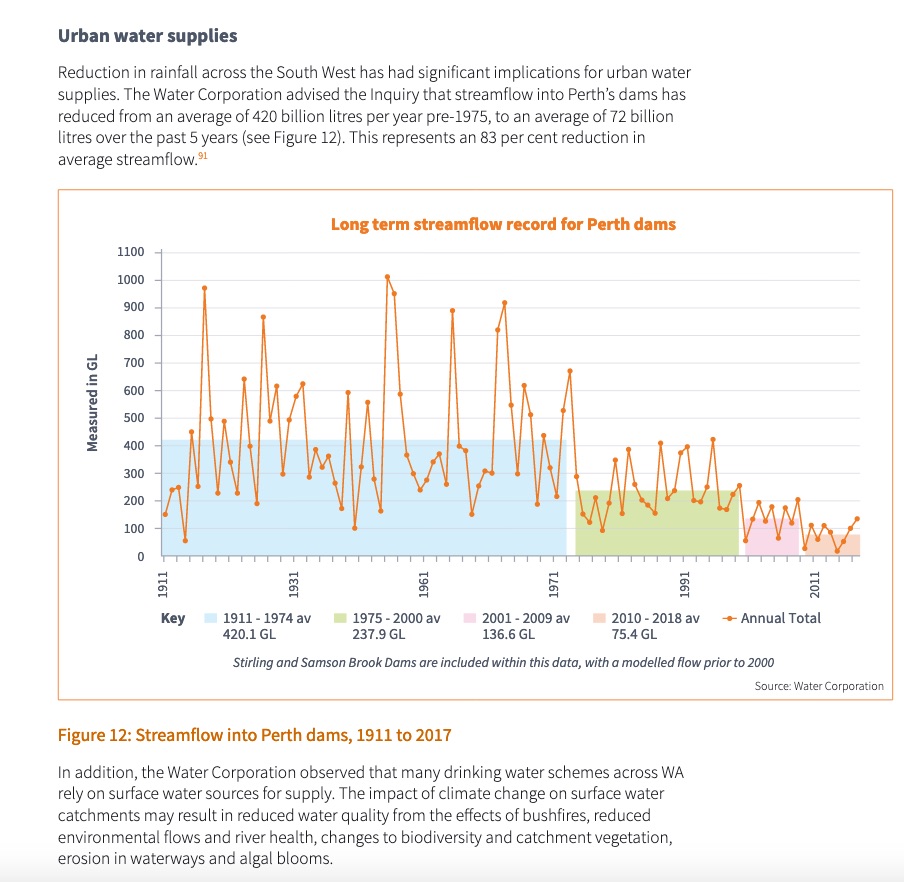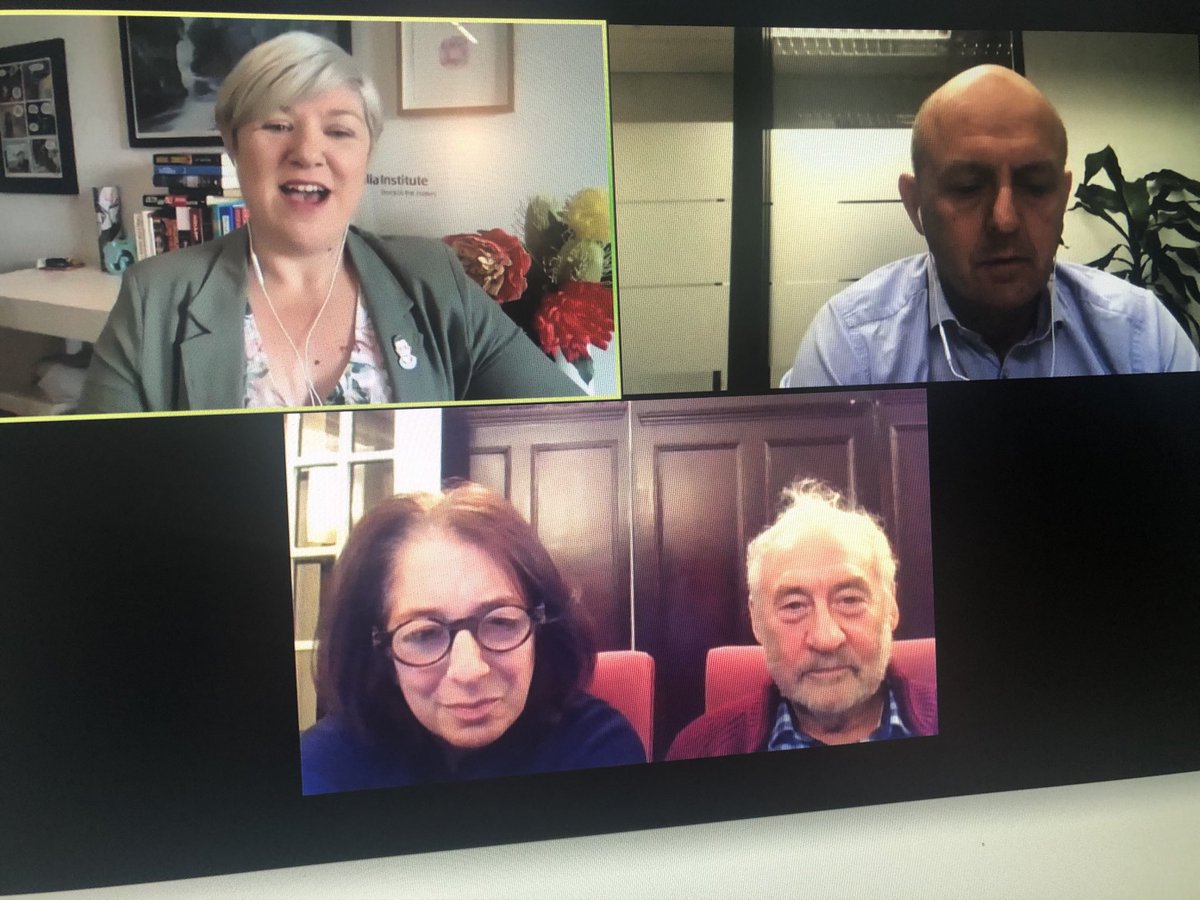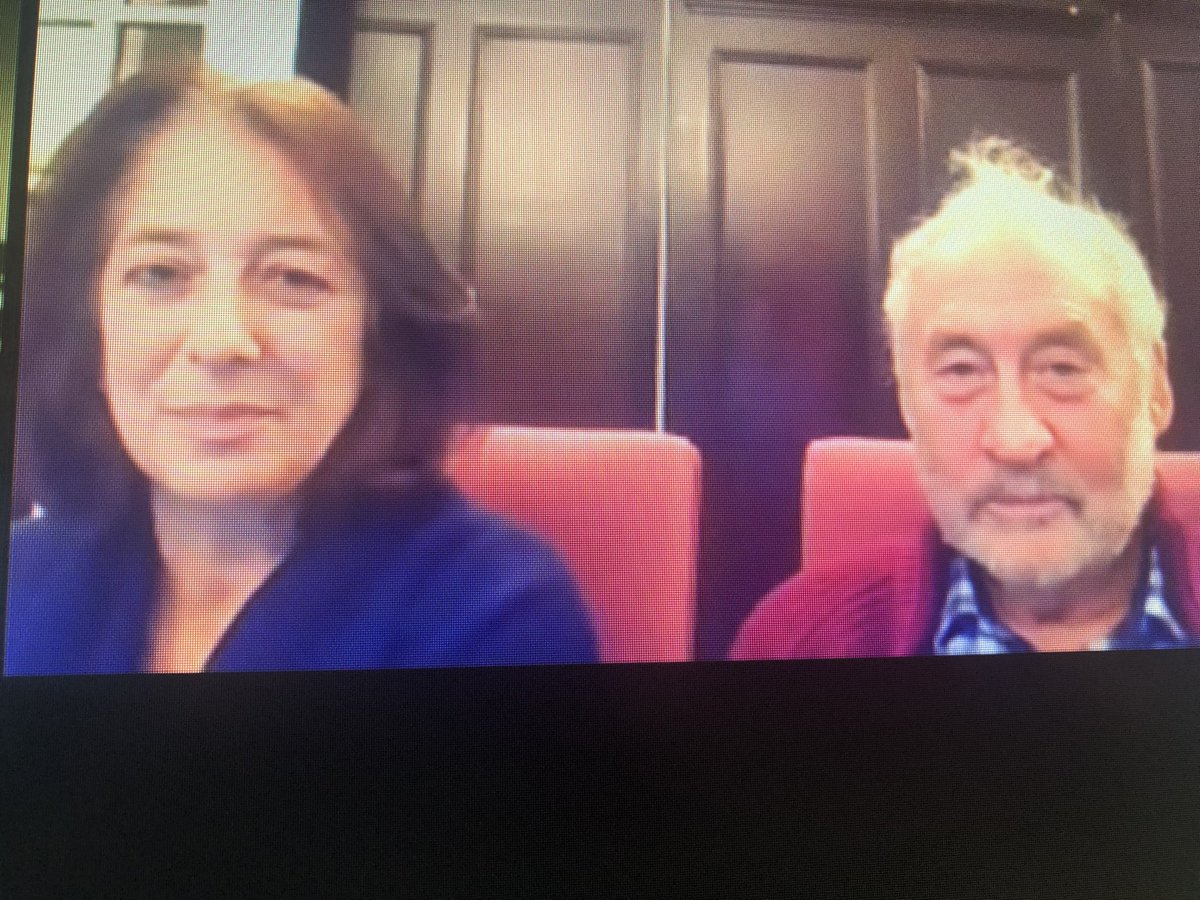
At @CroakeyNews we've been looking forward to the release of this report for a while now: Climate Health WA Inquiry: Final Report ww2.health.wa.gov.au/-/media/Corp/D… #ClimateCrisis #PublicHealth #AusPol 
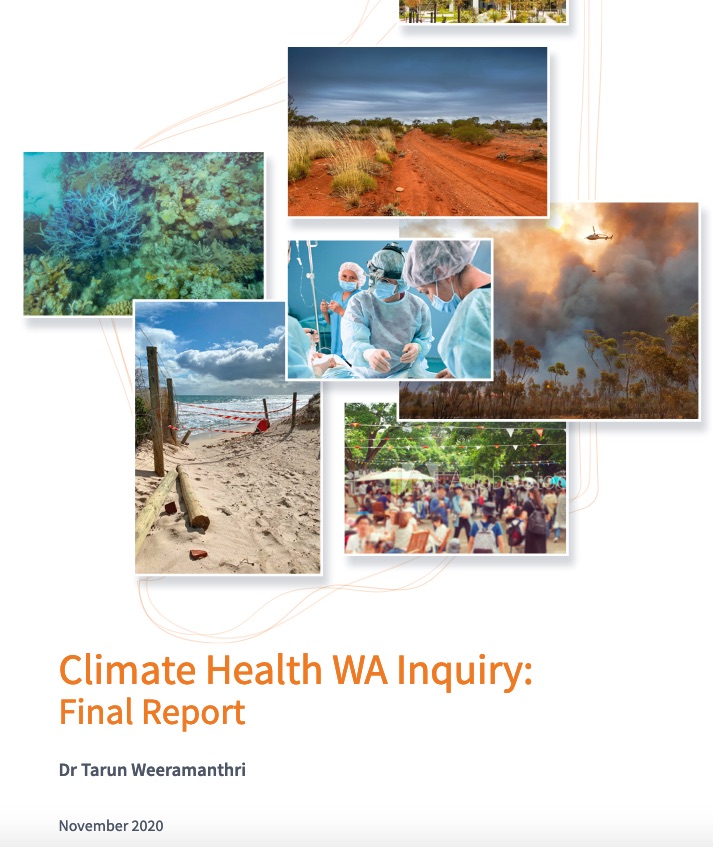
It comes in a very big week for #ClimateHealth news, as you can see from recent @CroakeyNews articles: croakey.org/category/globa…
To put the new report in context, it's worth re-reading our April 2019 coverage of WA's Sustainable Health Review, which led to the inquiry & report released today croakey.org/new-review-cal…
We are in a climate emergency with an ever-narrowing window of opportunity for action, and the wheels of government move so slowly, even when there is a commitment to action. At a federal level, they're not even turning, just back-pedalling.
The report begins: "To date, societal action has not proved timely or sufficient, either globally or in Australia, to counter the evident public health threat from climate change....
"Rising temperatures and changing climatic conditions, including more frequent and intense extreme weather events, have been linked with both direct and indirect impacts on human health, including heat-related illnesses, injury, and infectious and respiratory diseases.
And the health sector must get its own house in order; it's "a significant contributor to emissions, with a recent Australian study estimating that the sector contributes around seven per cent of all national greenhouse gas emissions"
Here are the report's 10 key findings. From #1: Next decade (2020–2030) is vital to address irreversible climate risk to #10: Aboriginal stewardship is as vital now as in our past 
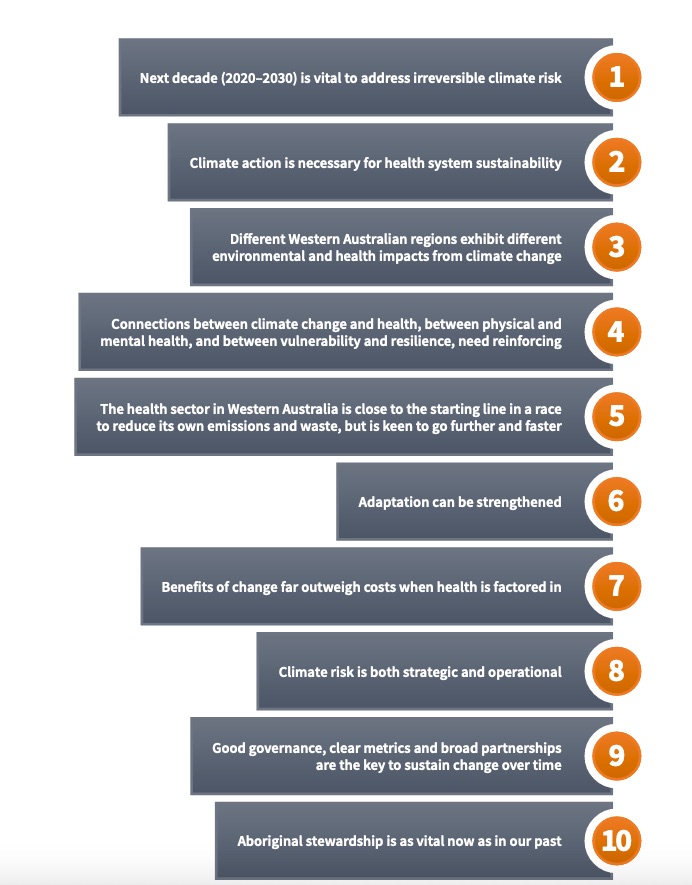
And 10 key recommendations, including "Seek complementary action at a national level in a federal system" ping @GregHuntMP @Bowenchris 
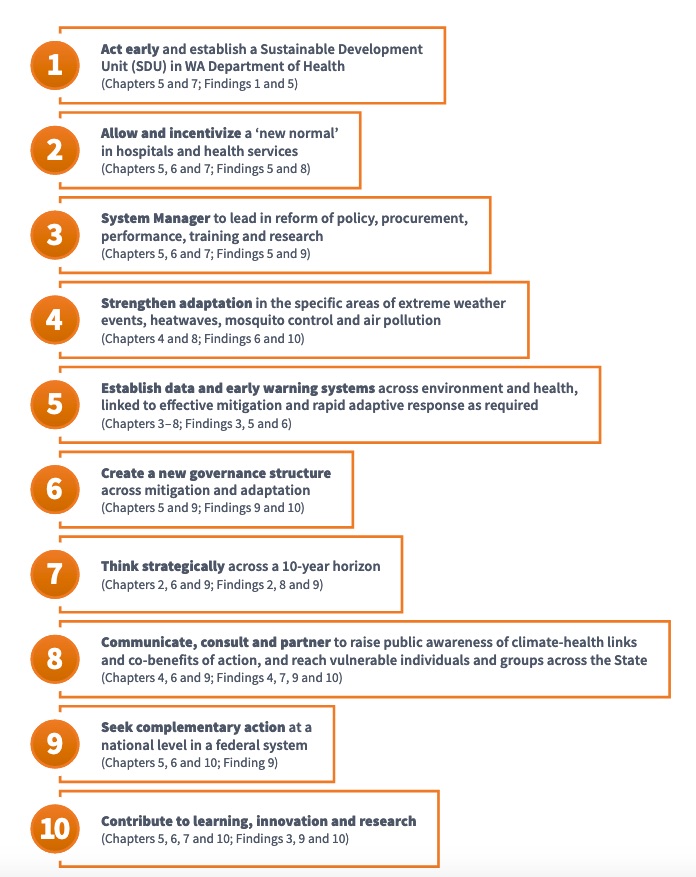
Review was 'place-based' ie acknowledging regional differences within such a vast state as WA - vulnerable to climate change, with falling rainfall in SW, drying interior, lengthening fire season, cyclones & extreme weather events, rate of sea-level rise almost 3 X global average
"To our knowledge, this is the first statutory inquiry anywhere in the world focused on the health impacts of climate change."
Report notes @WHO has been publishing reports on climate change & health since 1990s. It has a unit dedicated to the issue, doing awareness-raising, advocacy, monitoring evidence, building capacity, supporting countries to address etc. [This raises an obvious Q for Oz Gov!]
"Of the developed market nations, Australia has been recognised as being the second most vulnerable to the effects of climate change, after Israel." But report reminds us that Fed Gov has failed to act on 2017 report calling for a National Strategy on Climate & Health
For WA, risks include: extreme weather events including prolonged heatwaves, more dangerous bushfire conditions, more intense cyclones, coastal erosion and biodiversity loss... 
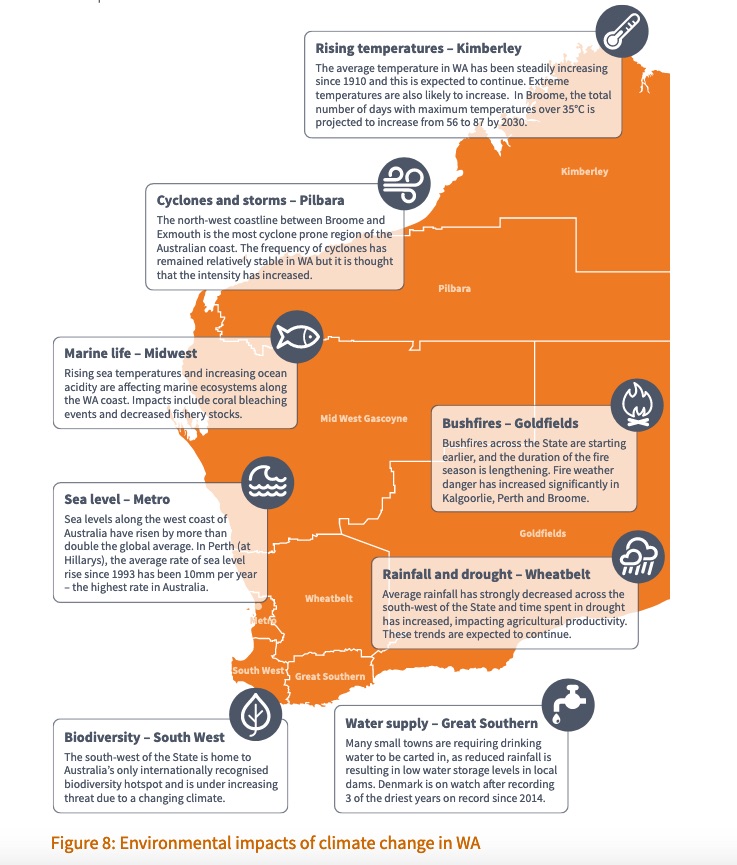
"In some areas, such as Broome, days with temperatures over 35°C could be experienced for around a third of the year by late in the century. In Perth, the numbers of days above 35°C and above 40°C are both expected to increase by 150 per cent over the same timeframe.
Really impt to remember this when we're discussing #HeatwaveHealth - it's not only an on-land issue: "The number of marine heatwave days a year increased by over 50 per cent between 1987 and 2016, compared to the period from 1925-54.
"In December 2019, the WA coastline experienced its most widespread marine heatwave since reliable recording began in 1993, with ocean temperatures 1.5 to 2°C warmer than normal for that month.
On the importance of local knowledge & understanding regional context: "The South West has experienced a marked drying trend; since 1970, average rainfall between May and July in this region has decreased by around 20 per cent compared to the average from 1900 to 1969.
"Since 1999, this reduction has increased to around 26 per cent. These drier, hotter conditions are leading to declines in soil moisture due to increased water loss from plants and soils, which exacerbates the drought conditions.
"Over this century, average rainfall is predicted to strongly decrease in the South West, and time spent in drought is expected to increase. Meanwhile, annual rainfall has increased over northern and interior WA, especially in the north-west during the tropical season.
"Tropical cyclones are responsible for most of the extreme rainfall events across north-west WA and generate up to 30 % of the total annual rainfall near Pilbara coast. Heavy rainfall is expected to become more intense across the north, with prolonged periods of drying in between
Water shortages are already affecting WA communities: earlier this year the WA Gov delivered 11 million litres of drinking water to 10 towns in the SW, with other towns also needing deliveries. Water for livestock also being trucked in.
WA is a big food producer for the nation and exports. Climate changes are hitting agricultural productivity hard already: droughts, changes in pests & pathogens, extreme weather. WA’s farming region has experienced the greatest decrease in productivity across the nation.
Climate conditions lowered agricultural productivity in WA by an average of 7.7 per cent between 2000–01 and 2014–15.98
WA's bushfire season has ⬆️ from traditional period of Dec-Feb, to Nov-May, Commissioner for Fire and Emergency Services told the inquiry. ⬅️less rain and drier conditions. This has also reduced opp for prevention measures such as prescribed burns➡️makes bushfires more hazardous.
Aboriginal people told the inquiry the effects of these fires were the “biggest killer” of country, on “artefacts, culture, food supply, animals, insects, plant foods, [and] ceremonial lands”.
Rising sea levels pose significant risks to WA’s coastal infrastructure & beaches. At Hillarys, a coastal suburb north of Perth, average rate of relative sea level rise since 1993 has been 10mm per year; this is the highest rate observed in Australia and over 3 X the global rate.
In Fremantle, coastal flooding has increased three-fold, while parts of Perth along the Swan River including Elizabeth Quay, Heirisson Island and sections of East Perth are at risk of being submerged by early next century.
Associated risks re saltwater intrusion into coastal aquifers, estuaries and wetlands: eg the City of Bunbury described how saline intrusion into groundwater bores and aquifers could impact its drinking water supplies and the irrigation of parks.
Local govts have such an impt role in climate responses: eg 9 local govts along SW coast, between Point Peron in Rockingham & Cape Naturaliste in Busselton, have formed Peron Naturaliste Partnership to build the resilience of their coastal communities
Chair of the Peron Naturaliste Partnership, Councillor Mark Jones, described risks to assets & tourism, plus imptnce of coastal environments for mental, emotional and physical health and wellbeing
Report describes dangers of “compound” events eg when a storm surge combines with heavy rainfall, causing extreme coastal flooding – or when a drought intersects with a prolonged heatwave.
Similarly, floods after bushfires magnify the impacts eg leading to ash and soil runoff into waterways, polluting catchment areas and affecting the quality of water supplies. [highlights importance of taking holistic approaches to research/policy ie don't just focus on one event)
Report cites evidence that more people have died because of extreme heat events in Australia than from all other naturally occurring hazards combined (including floods, tropical cyclones and bushfires).
Climate change expected to lead to a doubling of heat-related deaths over next 40 years because of⬆️in frequency, duration, intensity of heatwaves. Hospitalisations & death due to heat may occur on the same day as heat event or may have a lagged effect & happen several days later
Report lays out the many groups at increased risk from hot weather. Also people living in cities generally because of the urban heat island effect. Australia is one of the world’s most urbanised countries, with almost 90% of the population living in urban areas.
Report details some of work by WA Health Dept on heatwave & health research etc [many other jurisdictions also have heatwave plans etc - but don't waste time searching for a national healthwave strategy/action plan etc].
Report lays out a range of climate-related mental health impacts, esp for young people, farmers. Aboriginal people described the impact on their mental health and wellbeing. Changes in the look & feel of country, & the loss of biodiversity, are causing feelings of loss and grief
Stress, anxiety are also being felt because of difficulties maintaining culture & traditions due to changes in natural weather cycles, harsh weather conditions and/or inaccessibility to sacred sites & meeting places; also communities forced to move due to extreme weather events.
Report discusses other related hazards, inc air pollution & mosquito-borne diseases. WA is vulnerable to importation of dengue mosquitoes from overseas through planes and airports in particular. Over 40 interceptions of dengue mosquitoes were made at Perth airport between 2014-16
Egs of other infectious diseases linked to increased temperatures in the Pilbara, identified by the WA Country Health Service, inc cases of bacterial build-up such as rotavirus in swimming pools, and more frequent diseases of the soil such as melioidosis
Food security was a big issue at the inquiry, esp for regional and remote communities, where fresh produce is already scarce, is often of poor quality, and is significantly more expensive than in metropolitan areas due to transport costs cc @BronFredericks (re WA)
"Previously, the term ‘climate refugees’ was mostly used to refer to the displacement or migration of people from other countries...But over the last summer, Australia has seen whole communities destroyed by bushfire, with forced relocation for many families.
"Water scarcity can also lead to some remote communities in Australia, particularly small Aboriginal communities, becoming unviable, and subsequent displacement of the local population. This is also an example of how climate change contributes to the trend towards urbanisation.
The report reproduces an artwork representing Aboriginal experience of climate change, painted by Ronda Clarke as part of @TheAHCWA submission, as previously covered here by @Jade_Braddy croakey.org/ahead-of-landm…
The inquiry was told “it is important to recognise that climate change started for Aboriginal people at colonisation” & that the legacy of colonisation and subsequent government policy will compound the impacts of climate change for Aboriginal people
Equally, Aboriginal people have a strong history of stewardship, resilience and adaptation. Indigenous knowledge is critical to ecological science and the IPCC Global Warming of 1.5°C special report stresses the role of Indigenous peoples and local communities for climate action.
Report identifies a stack of population groups who are at increased risk of climate impacts: eg the Health Consumers Council raised concerns about the vulnerability of prisoners to extreme temperatures, especially heat. cc @MegBastard
Inspection of WA prisons by Office of the Inspector of Custodial Services recorded temperatures of up to 50°C in summer & noted that cells are generally not air-conditioned. Older facilities are especially problematic
"Throughout the Inquiry, the role of the health system in informing & educating the community on the health risks of climate change to build community resilience was emphasised." [a big ask when we don't have a national climate health strategy]
So much waste in the health sector, eg food, general waste, energy, as well as clinical waste. Report gives some case studies of efforts to address, eg n WA, Hollywood Private Hospital introduced an ORCA machine 2 years ago, to break down food waste into organic waste.
Speaking of which, how cool to see this @CroakeyNews story referenced in the report, HT @Jorja_Collins & @WePublicHealth: croakey.org/eating-green-g… cc @CroakeyServices
Re the ORCA machine, the hospital diverted over 200 tonnes of food waste from landfill - equivalent of taking 35 cars off the road. Telehealth is also helping reduce travel-related emissions.
Report cites research saying telehealth saved WA country patients from travelling 27.3 million km for outpatient appointments, saving aprox 5,000 tonnes emissions. Report has many such egs of services making efforts to reduce emissions but hard to assess how system-wide/embedded
Here's another section to make you weep: "History of climate and health research in Australia". [Short version - a sad and sorry tale of missed opportunities, years wasted...
"The Inquiry heard that at the turn of the century Australia was regarded as a world leader in the field of climate change and health with a large research network, a National Climate Change Adaptation Research Plan for Human Health, and dedicated funding. However...
..the Public Health Association Australia told the Inquiry at a formal hearing that national funding and investment in climate and health related research has been minimal since 2012. static number of scientific publications on health and climate change in Australia since 2014.
"As a result, Australia has failed to keep pace with international efforts in this area. .. while adequate research on basic links between climate change & health there are large gaps in knowledge about local & regional challenges as well as how we achieve change in that context.
Two grabs below representing bad news & some [limited] good news.. re investment in climate health research & action 



Report discusses co-benefits of climate action,eg Aboriginal-initiated natural resource management or ‘caring for country’ programs, aimed at climate adaptation, may also lead to social and emotional well-being co-benefits in remote communities.
A disconnect between employees' personal commitment to environmental sustainability - & whether they're empowered to make changes. Regular reporting on sustainability performance of health services essential to inform decisions, engage staff, drive action, hold system to account
Good to see the report including some impt history/context eg "The WA health system has a history of reporting on its greenhouse gas emissions. It was an obligation of all State Government departments until the late 2000s, at which point such mandatory reporting ceased.
"As a result, the issue was deprioritised across the system, emissions were no longer tracked, & momentum was lost. After a long period of inaction, this momentum needs to be re-gained. ..There is an opportunity for WA health system to immediately re-commence monitoring emissions
A theme coming through very clearly is the importance of local knowledge & context. Report highlights role of local govt. Eg WA Local Government Association told the inquiry emergency management ranks as 3rd highest priority for local governments.
Inquiry was told of a key gap in current emergency management system: the identification of where the more vulnerable people in our communities are, and what should be put in place to address their needs before a disaster occurs. Hence local engagement critical to address this
These 5 principles from WA's Public Health Act are relevant for climate change responses inc ‘functions of local government in relation to public health should be acknowledged and respected’. 

Report stresses need for a cross-sectoral approach to planning and designing climate resilient cities and towns - Urban development that incorporates health and climate change factors.
[We've been talking about some of these things for years!] Report notes Australia's first climate change adaptation report specific to health sector was produced by WA Health Dept in 2008, including a focus on Health Impact Assessment
The Inquiry heard that it is critical for health to work in partnerships with other sectors inc energy, environment, housing, water, transport, infrastructure, social services & all levels of government to set priorities that ensure maximum benefits for both health & climate
@TheAHCWA encouraged the WA health system to ensure it is “engaging with Elders, engaging with knowledge, respecting the expertise that Aboriginal people have from the 65,000 years they’ve on this country”
The inquiry noted many more examples of progress with climate adaptation in WA, than with mitigation. For example, there were relatively few established or evaluated initiatives to decrease emissions and waste in WA hospitals.
Many aspects of climate adaptation are established core business for public health, which has a structural home in the Public and Aboriginal Health Division in the WA Department of Health, and other public health entities in WA, including all local governments.
No such dedicated structural home was evident for climate mitigation activities – a structural gap. Hence the report's rec for a a Sustainable Development Unit adapted from the UK model
Another rec: The WA Department of Health should consider an ongoing, multi-faceted strategy to communicate and consult with the public, stakeholders, and partners on the topic of climate change and health.
Health consumers told the inquiry about a lack of easy access to clear information on climate change, or options to reduce their own environmental footprint [again, a national climate & health strategy could have addressed these information gaps YEARS ago]
Report says climate & health info should be accessible to people who are deaf or vision impaired, and people not connected digitally. And in a variety of formats & languages.
Report has a section titled, 'Aboriginal stewardship'. It cites a report by Anna Dwyer, a Karajarri woman, linguist and researcher, on climate change and adaptation in the Bidyadanga community in the Kimberley in 2012.
It is one of the few detailed descriptions of seasonal changes and rising sea levels in WA, and their impact on essential food sources and fresh water supplies. Her recommendations cover country and culture, communication, planning and working together, and cultural governance.
Report also cites a 2013 study of Indigenous climate change adaptation in Kimberley inc emergency management lessons from Warmun flood of 2011. "Aboriginal people must be involved in developing adaptation pathways, w traditional knowledge integrated into local & regional planning
WA Health Dept submission recommended the incorporation of Aboriginal perspectives into any evaluation framework, development of a ‘comprehensive communication strategy about climate impacts for Aboriginal people’, the creation of meaningful partnerships
The report says "There is no expectation that Aboriginal people have ‘all the answers’, but their knowledge needs to be respected and their voices listened to."
Report ends with calls to action & self reflection: though its focus is WA, many of the challenges described are common to other Australian states and territories and could be taken up at a national level.
Eg, the trade-off between infection control and single-use items could be re-examined by one of the expert national health committees, such as @ACSQHC or @nhmrc
Inquiry received 3 suggestions it said fell outside ToR (aka hot potatoes): 1. WA Health Dept should have a direct regulatory role in setting emissions reductions targets from industry 2. Dept should advocate for no further fossil fuel developments in WA
3. Dept should divest from fossil fuel companies, including the rejection of sponsorship, advertising, research funding and procurement.
Report says an "Achilles heel for the health sector and health professional groups" on climate is the gap between their prof statements/advocacy – and what the sector does to reduce emissions etc. cc @ama_media @anmf_federal @TheRACP @AusHealthcare @ACRRM @RuralDoctorsAus
"Any health advocacy for action will be more compelling if the health sector is itself acting to reduce emissions under its control."
The inquiry's approach was to ‘Make hope practical, not despair convincing’. Report says "Action dispels pessimism and creates a sense of agency and possibility, but it is well to remember that change is not painless and will require a shift in power and culture within the sector
But I don't know how anyone could read this report without feeling some despair. "It is not unfair to label 2010–2020 a ‘lost decade’ for climate action in the health sector in Australia and Western Australia.
"This Inquiry has provided evidence of a stalling of activity in monitoring emissions and waste, in policy guidance and research funding. Other initiatives, such as in workforce training or curriculum development, are occurring too slowly to make the needed difference.
"Climate science tells us the central truth that we do not have another decade to waste."
So that about wraps this Twitter thread/summary of the WA Climate Health Inquiry by @tarunw. Interesting that the report discusses the importance of communications but doesn't directly address the implications of the Australian media landscape for climate health action.
While the report acknowledges the importance of local knowledge, networks, resilience, communities etc, there is nothing on the crisis in public interest journalism & how that has affected local communities - esp critical in times of disaster & crisis, as we've seen this year
Likewise, the report doesn't address the impact of misinformation & disinformation on climate health action, or the role of the digital platforms in these spaces. These are really important determinants of community/political understanding & action on climate health matters.
Perhaps the @_PHAA_ @AHPA_AU @PHAIWA et al can address these matters if making submissions to Senate inquiry into media diversity in Australia - important for action on climate & many other public health threats: aph.gov.au/Parliamentary_… Submissions close 11 Dec.
• • •
Missing some Tweet in this thread? You can try to
force a refresh
